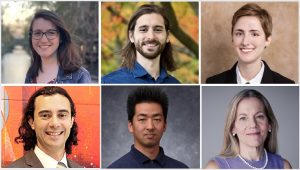
The following graduate students received NIH F30 and F31 Predoctoral Fellowships and are advised by McGowan Institute for Regenerative Medicine affiliated faculty members.
Multicellular Scaffold for Condyle Surface Regeneration
Summary: Sara Trbojevic (pictured top left) will use her F31 to research the temporomandibular joint, or TMJ, which is often overlooked in degenerative joint disorders like osteoarthritis. The TMJ is located in the jaw and is important for eating, talking facial expression, but it’s complex, since it’s made up of two joints that are mechanically interdependent, and its cartilage has a unique, thick, superficial fibrous layer. The project will focus on the development of an acellular therapy for the regeneration of the fibrocartilage and bone regions of the TMJ condyle surface.
Advisor: Alejandro Almarza, PhD (pictured bottom left), associate professor in oral biology in the School of Dental Medicine with a secondary appointment in the Department of Bioengineering
Astrocyte-Neuron Network Activity During In Vivo Brain Stimulation
Summary: Intracortical microstimulation (ICMS) is a primary component of fundamental neuroscience research and holds great potential for sensory restoration or sensory feedback in neuroprostheses. Despite the wide use of electrical stimulation with neuroprostheses and interventions such as spinal cord stimulation and deep brain stimulation (DBS), the fundamental physiological and mechanistic properties defining therapeutic efficacy remain poorly understood. Astrocytes are emerging as important cells in the modulation of neuronal activity and synaptic function on a time scale consistent with ICMS-induced neural activity. However, it is unclear how astrocytes respond to clinically relevant stimulation parameters on a network level, and how that activation subsequently modulates neuronal activity. In this project Kevin Steiger (pictured top center) will use a combination of two-photon microscopy, mesoscale imaging, and optogenetics or genetic manipulation (adeno-associated viral techniques) of astrocyte activity, to determine the dynamic relationship between astrocyte and neuronal calcium activity during ICMS, and understand how astrocytes respond to and may contribute to therapeutic efficacy of ICMS paradigms. Ultimately, the cumulative results of this project will provide valuable insight for fundamental neuroscience research and the design of stimulation paradigms to elicit astrocyte activity relevant to sensory restoration.
Advisor: T.K. Kozai, PhD (pictured bottom center), assistant professor of bioengineering
Development of a Novel Bioinspired Pelvic Organ Prolapse Repair Graft
Summary: Structural and mechanical deficiencies of the vaginal wall and supporting tissues are defining characteristics of pelvic organ prolapse, a common gynecologic condition. The aim of this study is to develop a mechanical and structural profile of vaginal tissue and use these parameters to inform design of a novel synthetic biomimetic graft for prolapse repair. Brittany Egnot (pictured top right) and their advisors will perform experiments to phenotype the mechanical and structural properties of vaginal extracellular matrix, synthesize an elastomer-hydrogel graft that resembles healthy vaginal tissue, and examine cell attachment and differentiation on these grafts.
Advisors: Pamela Moalli, MD, PhD (pictured bottom right), professor in the Department of Obstetrics, Gynecology & Reproductive Sciences, and Steven Abramowitch, PhD, W.K Whiteford Professor of Bioengineering
Congratulations, all!
Illustration: University of Pittsburgh Swanson School of Engineering (students)/McGowan Institute for Regenerative Medicine (advisors)
Read more…
University of Pittsburgh Swanson School of Engineering News Release
